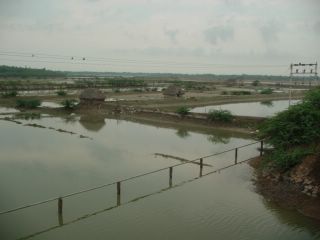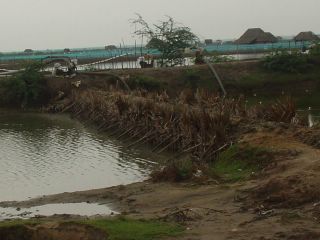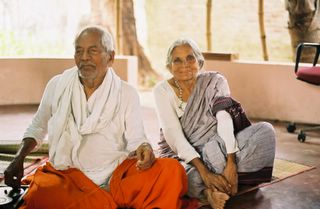The Mosquito's Humming (K. Saedi)
Appa’s campaign against prawn farming in the coastal areas includes organizing marches by the villagers, which are coordinated by LAFTI workers. In order to stop this, the prawn farmers have asked the courts to issue writs against them. Many people have been acquitted and even praised by the judges for their community works, but some of the hearings are still ongoing.
I got up early to go to court with Veerasamy, but he heard that his sister-in-law, who was suffering from cancer of throat, had died. The court was notified and he went to his village to arrange the funeral. I said goodbye to Gina and Alexia who went on their onward journey in India. In the afternoon, Muthukumar, the driver, and Marimuthu, one of the micro-credit coordinators, took me to the vocational training centres. We had to cover a lot of mileage and the journey was slowed down due to potholes filled with rainwater (it had rained heavily during the night), kids (the goat variety) running onto the road and the villagers laying pulses (lentils) on the road; the cars drove over them and facilitated the process of separating the seeds. The whole countryside smelt of fermented mung beans but we enjoyed the scenery of palm trees bordering the rice fields and along the rivers, village tanks covered with Vengaitamarai (onion lotus) flowers, cotton fields in bloom, and Tamil music played on the cassette recorder in the car!

Cotton fields in bloom
I learnt that all vocational training groups follow the same format: 20 participants are offered training for a period of six months. They attend daily classes run during morning and afternoon sessions, and cover both theory and practice. LAFTI instructors are recruited locally if possible or sent to different localities. They are paid 2000 rupees per month. The participants are also paid 450 rupees per month for possible loss of work. They are expected to learn to work independently towards the second half of the course, by which time some are already engaged in small jobs and earning money. At the end of the course, they are given a certificate of attendance and efforts are made to find employment wherever possible. LAFTI runs these courses locally and where there is demand from the villagers.

Tailoring class
We travelled to Tirumarugal to see the tailoring workshop. There was a jovial atmosphere in the group, and the young women competed in showing us their work and explaining different types of stitches used for making clothes and decorative work.

Electrical and plumbing work class
In Enanangudi, the instructor for electrical and plumbing work spoke English and was able to describe the course content, which was taught both in English and Tamil. The participants were adult males. = This group had started on 2nd December 2004 and was due to end on 2nd June 2005. The quality of knowledge and experience was impressive, and some of the participants were already in part-time employment. Most were confident about obtaining full-time work after completion.
We drove back to catch up with Amma who had already left for the funeral of Veerasamy's sister-in-law. I got there just in time to attend the burial and feed milk and lemon to the deceased. Her son Lakshman had finished his 12th standard exams the day before. He was very distressed by the sudden death of his mother, and I was told that he and his sister will remain in their house for the next 16 days. They will have the support of the whole family who will sleep in the house with them. He is a charming boy who helped with LAFTI's tsunami relief work; normally, he stayed in LAFTI’s hostel and went to school from there.
Friday 8th April
Veerasamy had gathered all the LAFTI workers and was in a buoyant mood. When I inquired why, he said, “Yesterday was for mourning the death of my relative; today we celebrate the donation by the ONGC (Oil and Natural Gas Corporation Ltd) of two-and-a-half lakhs of rupees to LAFTI.”

Komalapettai brick factory
Amma was gone again, this time to meet a local government official from Nagapattinum District regarding bank loans for the land purchase. She had made food for us to take on our trip to Komalappettai village. We saw another brick factory Again the rain had destroyed the bricks but thousands of bricks waiting to be baked were kept under a straw roof and were intact. We also visited the computer class in the village. Due to high demands, the class had been divided between the participants, with morning sessions for women and the afternoon sessions for men. The instructor and the participants were able to speak English and explained the course in details. It was taught in English and covered the history and the development of computers and software. The young women were confident and thought there were good job prospects for them, e.g. in Photo Editing and DTP Operating.

Computer class
On our way back, we visited another housing project in Vengatangudi village. 11 out of a total of 25 houses had been completed but the building work had been interrupted by the rain. While we were there, LAFTI's lorry brought tile roof sections and everyone wished for the rain to stop soon.

Housing programme in Vengatangudi
I had set aside the afternoon to write down my observations but my computer crashed and I spent the rest of the day in Tiruvarur computer shops and markets! The town was bustling with street vendors selling flowers and fruit. People added color to already colorful poster paintings on the walls and the signs on the shop fronts. We had plenty of smiles, greetings and requests for photos along the way!

Town of Thiruvarur
Saturday 9th April

Amma, LAFTI workers, and I went to see the prawn farms. It was sad to see that the farms had already been re-established after the tsunami and were going on for miles along the tidal rivers (somehow I was glad that Appa could not see this, as he would probably start his hunger strike straight away). On one of the rivers, way inland, the villagers had built a wall to stop the seawater from travelling upstream and contaminating the rice fields.

Wall built by villagers to stop the inflow of seawater
There were still prawn farms for about a mile beyond this point and the prawn farmers had to use pipes across the fields to pump in the seawater. It was clear that the wall was only a temporary measure, as a high tide would easily overflow the wall. LAFTI has applied to the government to build a barrier dam to regulate the flow of the water.

Pallankallimedu
We visited two villages along the tidal rivers. In Pallankallimedu, 160 Dalit families out of a total of 170 have signed up for LAFTI's housing programme. They were working in three separate groups to make bricks, and four and a half lakhs of bricks were ready to be baked when weather improved. The village ‘gramsabha’ (council) will decide who receives the 50 houses built during the first phase of the project.

Government constructed home
LAFTI has chosen this village for two reasons: Firstly, the houses built by the government, (under the laws covering the uplift of the untouchables) had been poorly constructed and some were in the process of decay or had collapsed due to heavy rain. Secondly, the men were tidal river fishermen and as such did not qualify for the tsunami relief aid, even though they were frequently faced with losing their nets and the supply of fish with eachrain storm and flooding. LAFTI distributed rice and blanket to the villagers every time they were out of work.
In the second village, Talainairu, men were at work carrying sand to nearby ground for brickmaking. 16 houses had been completed and two and a half lakhs of bricks were already baked and ready to use. In this village, all the material for building 30 more houses were in place, but the rain had interrupted the work.

Talainairu
In the evening, Appa and Amma talked about the prawn farming. Appa had heard from his lawyer in Delhi that the retired judge appointed to oversee the implementation of the order to stop illegal prawn farming was in fact being paid by the Ministry of Agriculture! Appa was planning to write to his lawyer, and I offered to meet him in Delhi on my way back to London and discuss Appa’s concerns.
Sunday 10th April
In the morning, I went to see Lakshman, with Veerasamy and Barathimogen, the warden for the boys' hostel. The entire village consisted of Veerasamy's relatives (he heads the families whose parents have passed away and attends to them even though he and his immediate family live in Kilvelur, not far from LAFTI''s office). Despite the sad occasion, there was a warm family atmosphere and we went from one house to another to visit his relatives. All but one of the houses had been built by LAFTI and every family owned land. Interestingly, all the young people were in continuing education or working in a professional capacity, and only the parents were attending to the land. They envisaged that sometime in the future, they will have to employ farm workers to tend their land!

Veerasamy's Village
It began to rain again in the morning so the afternoon was hot, humid, and full of mosquitos; even Amma was bitten a few times and had to use repellent cream. Nevertheless, we sat outside to fulfil Tamba's (photographic) requirements for a shadow-free film set before I interviewed Amma for a promotional film on LAFTI's work. I hope this will be ready for use in the near future, after Amma has approved the edited version of course.

LAFTI workers
When it rains, all LAFTI workers crowd in the ashram, as no work can be done in the villages. It is quite an opportunity for people like me to get to know the LAFTI family of workers and hear their stories of becoming involved with its work. On these occasions, Amma seems to take the opportunity to give little gifts to the workers in appreciation of their "giving their services to others". A few days ago, she distributed 20 stoves someone had donated, and today, she gave rice to all the workers. She said laughingly, "Charity starts at home".
It was very hot and humid, and I commented that only the insects seem to thrive in this climate. Later, Amma told me that while she was sleeping, she heard the humming of a mosquito and it was so beautiful, as if it was chanting; she felt that all creatures seemed to be in communion with God.
Monday 11th April
When I woke up, Amma had already gone to see a landlord to ask for a piece of land for a brick factory in Vadankalur village and, as usual, she came back having achieved her goal.
It had been raining on and off for nearly ten days and this morning, it rained the heaviest yet. Amma came back and she had, in her hand, an invitation to attend an inaugural ceremony of a Shiva temple in Vidangalur village on 21st April. The landlord was relying on the fact that "people have no difficulty paying to temples", and he had in fact received 7 lakh rupees from a benefactor in Chennai. The landlord had asked LAFTI for rice, to be distributed to the poor on the opening day of the temple, and Amma had obliged, “After all, it goes to the same people” she said. In the past, Amma had talked, with equal acceptance and tolerance, about the expansion of Muslim community in this area, and their entrepreneurial approach to the land. "They go to Dubai or Muscat to work and bring back lots of money. They buy the land to set up businesses, and this pushes up the price. Once they tried to fill the village tank to make space for a shopping centre!" She has good relationship with the Muslim clergy of the mosque built next door to Vinoba Ashram. One day, the Father from Kilvelur Church came to give his support for LAFTI's work. Afterwards, Amma said, “The villagers have converted to Christianity but their situation has not changed, and they continue to live in their mud huts.”
Tuesday 12th April
I talked to Appa after having read the correspondence with his lawyer since 2001. He briefed me about the course of action he was proposing, to be discussed with the lawyer in Delhi.
The remainder of the day passed too quickly, as I went around saying goodbye to LAFTI workers and some of the boys from the hostel who had come to say farewell. It was hard to leave and I consoled myself that I would be back to see Amma and Appa before long.
I stayed a few days in Chennai and went to Delhi on 15th April. I did see Mr Mehta, Advocate of the Supreme Court, and we had a fruitful discussion, which is now being pursued further by David Albert and the Jaganathans: how best to go forward with the campaign against the expansion of prawn farming and the destruction of the environment. Clearly Amma and Appa’s quest and their life-long and tireless efforts to fight injustice and exploitation continue.



0 Comments:
Post a Comment
<< Home